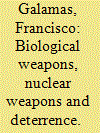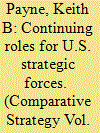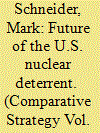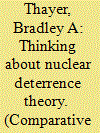|
|
|
Sort Order |
|
|
|
Items / Page
|
|
|
|
|
|
|
| Srl | Item |
| 1 |
ID:
083795


|
|
|
|
|
| Publication |
2008.
|
| Summary/Abstract |
The strategic use of biological weapons has presented some difficulties. Biological weapons use has been always uncertain, invisible, and delayed due to factors such as the incubation period. With the intervention of biotechnology techniques, the possible applications of biological weapons may increase and gain new strategic value. That may enhance the deterrence capability of these weapons against countries with nuclear weapons. To better understand these changes, we must look first at how biotechnology can eliminate some of the disadvantages of the strategic biological weapons use and therefore may enhance the use of biological weapons for deterrence.
|
|
|
|
|
|
|
|
|
|
|
|
|
|
|
|
| 2 |
ID:
083419


|
|
|
|
|
| Publication |
2007.
|
| Summary/Abstract |
The loss of strength gradient (LSG), which demonstrates the importance of geographic distance and the advantage of forward basing, has been under attack. Proximity is supposedly becoming less important for prevailing in war. It is a view that has been expressed not only by President George W. Bush but even by the person who devised the LSG, Kenneth Boulding. As a result, it is being used as reason for the withdrawal of U.S. forces back to the American homeland. However, this view is flawed. Distance is retaining its importance as a result of two factors: the competitive nature of war and the impermanence of great-power status. The United States cannot withdraw forward-positioned forces and expect to maintain permanently the same power projection capabilities.
|
|
|
|
|
|
|
|
|
|
|
|
|
|
|
|
| 3 |
ID:
083412


|
|
|
|
|
| Publication |
2007.
|
| Summary/Abstract |
The rise of hostile rogue states, new terrorist threats, and the proliferation of WMD and missile technology have all highlighted our need for an effective deterrence strategy in this post-Cold War environment. The fundamental questions of strategy we now face are to understand what and how we may be able to deter in a new strategic environment. Unfortunately, most of what we believed was true about deterrence during the Cold War is now misleading because international conditions have changed so dramatically. This conclusion does not suggest that we discard deterrence. It does, however, explain why our Cold War strategy of deterrence based on offensive nuclear forces and a mutual balance of terror must be reconsidered in toto
|
|
|
|
|
|
|
|
|
|
|
|
|
|
|
|
| 4 |
ID:
083798


|
|
|
|
|
| Publication |
2008.
|
| Summary/Abstract |
The Pentagon has proposed developing conventionally armed, long-range weapons for a relatively new mission referred to as "prompt global strike". A weapon concept often considered for this mission is the modification of existing intercontinental ballistic missiles to deliver conventional munitions with precision accuracy. On the surface, this option appears straightforward and relatively inexpensive. However, Pentagon officials have, in the past, preferred other weapon concepts. Several developments over the past year combine to warrant a new look at this concept. This paper compares the conventional ICBM concept with alternative weapon concepts for the conventional prompt global strike mission.
|
|
|
|
|
|
|
|
|
|
|
|
|
|
|
|
| 5 |
ID:
083796


|
|
|
|
|
| Publication |
2008.
|
| Summary/Abstract |
How to cope with uncertainty-this is the central unavoidable challenge to defense planning. The problem is how to finesse the fact that the future is unknown. Although we cannot know what will happen, we can call upon a great deal of experience to provide helpful guidance. We know: that the future is not "foreseeable"; that the past is our best guide to the future; that history often is non-linear; that history moves more in circles than ever-onwards toward 'progress'; that the present is an unreliable guide to what is to come; that history is too complex to be reconstructed usefully by playing "what if …"; that scientific prediction is utterly unreliable; that tragedy happens; that human folly is always possible; that people matter profoundly; and that people(s) fight for reasons of "fear, honor, and interest," as they always have. Warned by these major caveats, we can adopt some useful precepts to guide defense planning.
|
|
|
|
|
|
|
|
|
|
|
|
|
|
|
|
| 6 |
ID:
083797


|
|
|
|
|
| Publication |
2008.
|
| Summary/Abstract |
Opponents of the Conventional Trident Modification (a non-nuclear submarine-launched ballistic missile), European-based long-range missile defenses, and the Reliable Replacement Warhead (a new nuclear warhead) have exaggerated the possible drawbacks of these capabilities and overlooked the opportunities they represent. Deployment of long-range non-nuclear strike systems (like the Conventional Trident Modification), missile defenses, and the Reliable Replacement Warhead (along with improvements in the nuclear weapons infrastructure) over time could diminish the requirements for nuclear weapons and enable further reductions in the size of the U.S. nuclear weapons stockpile
|
|
|
|
|
|
|
|
|
|
|
|
|
|
|
|
| 7 |
ID:
083799


|
|
|
|
|
| Publication |
2008.
|
| Summary/Abstract |
The United States must maintain an effective nuclear deterrent because, without it, the U.S. could be destroyed as an industrial civilization, and our conventional forces could be defeated by a state with grossly inferior conventional capability but powerful weapons of mass destruction (WMD). Both Russia and China have the nuclear potential to destroy the U.S. (and our allies) and are modernizing their forces with the objective of targeting the U.S. missile defenses and conventional strike capabilities, while critically important elements of deterrence and national power simply cannot substitute for nuclear deterrence. In light of the emerging "strategic partnership" between Russia and China and their emphasis on nuclear weapons, it would be foolish indeed to size U.S. strategic nuclear forces as if the only threat we face is that of rogue states and discard the requirement that the U.S. nuclear deterrent be "second to none."
|
|
|
|
|
|
|
|
|
|
|
|
|
|
|
|
| 8 |
ID:
083801


|
|
|
|
|
| Publication |
2008.
|
| Summary/Abstract |
In May 2008, India successfully test-fired the 3500 km range surface-to-surface nuclear capable Agni-III missile. In many ways, Agni-III is the centerpiece of India's credible, minimum deterrent nuclear posture. Yet while the successful test-firing of Agni-III goes a long way in enhancing the credibility of India's nuclear posture, it is unlikely to lead to an effective Inter-Continental Ballistic Missile (ICBM) capability for India in the near term, as some have speculated. This article first examines the evolution of the Agni family of missiles as part of India's ambitious IGMDP followed by an explication of the role that India's space program has played in supporting Indian ballistic missile program. Subsequently, the strategic factors that have driven India's pursuit of Agni-III are outlined.
|
|
|
|
|
|
|
|
|
|
|
|
|
|
|
|
| 9 |
ID:
083800


|
|
|
|
|
| Publication |
2008.
|
| Summary/Abstract |
Alone among America's Western allies, Canada seems to have had the most difficulty adjusting to the idea that America was deploying a limited missile defense system in North America. Within Canada, one province in particular has seen a near-consensus develop against missile defense. That province is Quebec, where the system has been routinely criticized as being fraught with unspecified peril for Quebec and Canadian interests. Yet within the ranks of Quecec sovereigntists who have been most critical of missile defense, there are many who insist that an independent Qubec would play a part in the Western world's current alliance and other security structures, NATO and NORAD in particular. Joining the latter, however, would pose a major contradiction for sovereigntists, given NORAD's role in missile defense. This article describes and analyzes this instance of "strategic doublethink
|
|
|
|
|
|
|
|
|
|
|
|
|
|
|
|
| 10 |
ID:
083427


|
|
|
|
|
| Publication |
2007.
|
| Summary/Abstract |
For too long, nuclear deterrence theorists have remained apart from the revolution in the life sciences, and particularly evolutionary psychology, which has fundamentally changed the scientific understanding of the human mind. As a result of advances in evolutionary psychology, we now know that how the brain interprets actions and makes decisions is complicated, imperfect, greatly dependent upon emotions, and varied among humans. Consequently, it is fundamentally nave and dangerous to assume a similar outcome in deterrent situations when there is variation in cognition among leaders. The rational deterrence model's assumption of a universal rationality is irredeemably flawed and students of nuclear deterrence must replace it with a gradated understanding of rationality.
|
|
|
|
|
|
|
|
|
|
|
|
|
|
|
|
| 11 |
ID:
083418


|
|
|
|
|
| Publication |
2007.
|
| Summary/Abstract |
The lack of an institutional capacity and a legal authority to train foreign police forces is undercutting U.S. security assistance in the war on terror. From Iraq to Afghanistan to the Philippines, effective police forces are a key component of efforts to combat insurgency. This article discusses the importance of effective policing to counterinsurgency, briefly explores the history of American police assistance during the Cold War, and proposes a means by which, for a fraction of what it spends annually on military assistance programs, the United States can leverage domestic police academies to provide high-quality support and assistance to foreign law enforcement agencies.
|
|
|
|
|
|
|
|
|
|
|
|
|
|
|
|
| 12 |
ID:
083417


|
|
|
|
|
| Publication |
2007.
|
| Summary/Abstract |
The phrase "long war" is being used by the Bush officials to describe the intricacy and obduracy of America's ongoing struggle with the self-styled "global jihadists." Even though there are some similarities between this concept and the concept of "Cold War," the unique nature of the long war is making it difficult for the United States to develop an effective winning strategy. For the long war to conclude in America's favor, both Iraq and Afghanistan have to be stabilized and have effective governments, which should be perceived as legitimate by their respective citizens. Unless that happens, the United States will not be able to turn the tide of the long war in its favor.
|
|
|
|
|
|
|
|
|
|
|
|
|
|
|
|
|
|
|
|
|